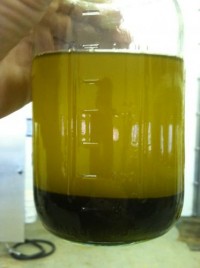Biodiesel

Biodiesel is a domestic, renewable fuel for diesel engines. It can be mixed in any concentration with petroleum-based diesel fuel. Engine components must be specially manufactured or modified to accommodate 100% pure biodiesel. The most common blend, B20, is 20% biodiesel mixed with 80% regular diesel fuel. B20 works in any diesel engine with few or no modifications to the engine or the fuel system. Biodiesel has a higher octane rating than most standard petroleum-based diesel fuel
.Biodiesel also provides significant lubricity improvement over petroleum-based diesel fuel. It has a solvent effect that may release deposits accumulated on tank walls and pipes from previous diesel fuel storage. It can be used as an additive in diesel to increase the lubricity of pure Ultra-Low Sulfur Diesel (ULSD) fuel.
Lower-level biodiesel blends-up to 20% biodiesel-can be used safely in most diesel engines. Higher blends may also be used in engines built since 1994 with little or no modification. (Always consult with the original manufacturer and engine warranty statement before using biodiesel).
While cold weather can cloud and even gel biodiesel the same as any diesel fuel, the use of cold flow improvement additives has resolved this problem.
Pure biodiesel (B100) is considered an alternative fuel under Environmental Policy Act. Lower-level biodiesel blends are not considered alternative fuels. Pure biodiesel is the only alternative fuel to have fully completed the health effects testing requirements of the Clean Air Act. The use of blends such as B20 in a conventional diesel engine results in substantial reductions of major pollutants from the burning and exhaust of diesel fuel.
Sources: Michigan Department of Management and Budget, American Coalition for Ethanol, Minnesota Department of Commerce.



 Print
Print Email
Email